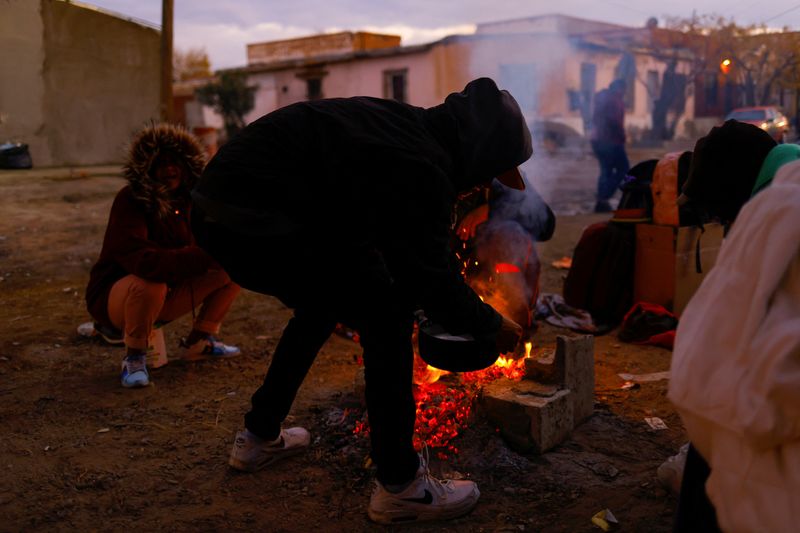Federal, state and local authorities along the US-Mexico border have been bracing for a possible surge in already record numbers of migrant crossings if COVID-era restrictions are lifted this week, and some estimate that tens of thousands of people are waiting in Mexico for news of the policy change.
US Representative Henry Cuellar, a Democrat whose South Texas district borders Mexico, has said — citing US border officials — that an estimated 50,000 people are waiting in Mexico for a chance to cross if restrictions are lifted on December 21, as ordered by a federal court.
Those waiting include about 200 Venezuelans who have been sleeping in a church in Ciudad Juárez, a Mexican city across the border from El Paso, Texas, in recent weeks in anticipation of the possible end of an order known as Title 42 that has barred entry to many asylum seekers since early 2020.
US President Joe Biden’s Democratic administration is bracing for the possibility of 9,000 to 14,000 migrants a day attempting to cross the border if Title 42 is lifted, Reuters and other media have reported, roughly double the recent daily rate.
On Monday, White House press secretary Karine Jean-Pierre told a news briefing that the administration was “increasing resources” at the border to prepare, stressing that “the border is not open” as migrants who enter illegally could still be removed by other means if the order is no longer in effect.
But due to an ongoing legal battle, it remains unclear if Title 42 will end on Wednesday.
The public health order aimed at slowing the spread of COVID-19 was issued in March 2020 under former Republican President Donald Trump, an immigration restrictionist, and has been in effect for more than a year by the Biden administration.
A federal judge ruled last month that the order was illegal, but a group of states with Republican attorneys general asked the US Supreme Court on Monday to intervene to stop it from being lifted this week.
Since Biden took office in January 2021, about half of the roughly 4 million migrants on the US-Mexico border have been removed under Title 42, while the other half have been removed. has allowed him to enter the United States to pursue his immigration cases. Mexico only accepts the return of certain nationalities, including some Central Americans and, more recently, Venezuelans.
El Paso has been receiving large groups of asylum-seeking immigrants for months, including many Nicaraguans who cannot be deported to Mexico. On Saturday, the city’s mayor declared a state of emergency to evict migrants from the city’s streets as temperatures have dipped below freezing.
In anticipation of the termination of Title 42, the US Department of Homeland Security (DHS) last week updated a six-pillar plan that provides for the supply of resources and personnel to the border and the expanded use of removal proceedings. accelerated.
The revised DHS plan suggests there could be an expansion of legal avenues for immigrants to enter the country from abroad, similar to a program launched for Venezuelans in October.
Biden officials have privately discussed using various Trump-style schemes to discourage people from crossing, including a ban on single adults applying for asylum at the US-Mexico border.
DHS has also asked Congress for $3.4 billion in additional funds to manage the border as part of a spending bill that is expected to pass before the end of the year, but the extra resources are not certain to pass.
In El Paso, shelters have struggled to accommodate arriving migrants, straining limited resources that are already accommodating the local homeless population. Municipal authorities say that most of the migrants who arrive have other destinations in the United States, and that many go to join relatives in other places. But the volume of people crossing, including those without US sponsors paying for their onward travel, has made it difficult for them to move quickly.
The El Paso Rescue Mission, a shelter near the border, housed 280 people last week, well over its 190-person capacity, with people sleeping on cots and inflatable mattresses in the chapel, library and conference rooms. conferences, Nicole Reulet, the shelter’s director of marketing, said in an interview with Reuters.
“We have people we say to, ‘We don’t have room,'” she said. “They beg for a place on the ground”

